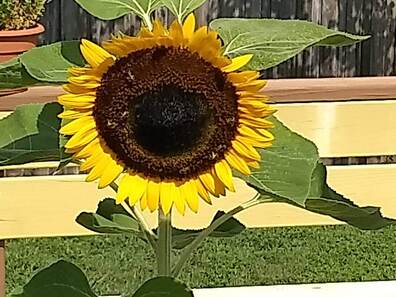 Baby birds chirp from moss-draped oaks and ducklings scurry after their mothers at the pond. Blooms explode in beds. Wildflowers pop up in yards. Butterflies and bees flit from my sunflower to Purple Queen, then travel to my neighbor's yard to sample their plumbago. I'm energized by nature, so you'd think all this new life and activity would inspire my brain to spin story. It hasn't. A couple weeks ago, I brainstormed a story with my agent and I was excited by the ideas it sparked. The story had a relatable protagonist, an intriguing premise and the potential for a satisfying outcome. The setting was moody, mysterious and a little quirky. There was a touch of magic. The magic grew and grew, and the plot took unexpected turns. As the story developed, my shoulders and neck tensed, and panic crept into my head. I asked myself why and had a revelation. I had allowed my imagination to veer too far from my life experience, and the story began to feel forced. For me to write authentic story, it needs to grow from people and experiences I relate to, and the magic needs to evolve organically. It's a valuable lesson. It helps me know myself better as a writer, and I hope it will help me write better books. But it wan't easy giving up that story. I'm restless and anxious when I'm not productively creating. I have another story started. It's growing slower than I'd like, but I'm trying to be patient. I think I'll go outside and commune with the flowers and bees. Maybe they'll buzz plot to my muse!
0 Comments
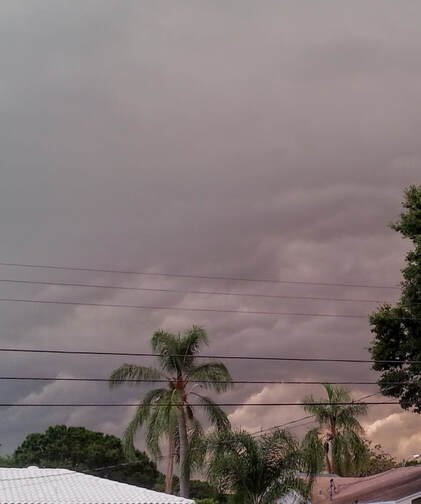 Storm is a good word for what happens to my brain when a story erupts. I'm a fourth generation Floridian, I grew up with storms, and heard stories of hurricanes past. I love and fear them, as I do story. I love reading and creating stories and I fear I'll never do the stories in my head justice. I just finished a book and passed it to my agent. I'm letting go of the story world I've lived in for the last year, saying goodbye to the characters. Next week, my agent will submit the book to publishers, hoping to find a good fit. I've learned it's best to not waste energy on wondering if I did my best or expectations for its success. Instead, I focus on the next project. The idea for a new story came to me a while ago. I put it in a box. I lifted the lid every so often and peeked inside, but I didn't take it out of the box until last week. I listed all that I knew about the characters and their world. Then I shared it with my agent. She poked and prodded and asked lots of whys and what ifs. My husband and I walk every morning and for the last two days those whys and what ifs have fueled our steps. I walked over three miles yesterday, trying to figure out where a boy named Ash came from and why a girl named Roan was allowed in the woods. The answers to those questions lead to more questions. They twist and churn into a tornado. Soon, I hope, the beginning will pop out of that storm. It's a magical moment when the main character takes her first steps on a clean page, and she brings a steady rain of words to fill the pages after. I pray they're the right words to describe the storm in my head. 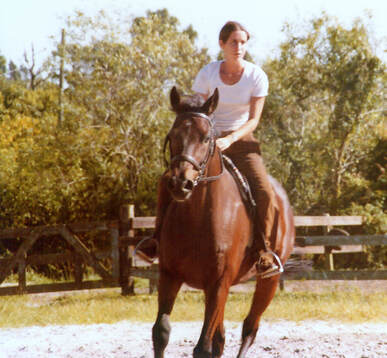 This is me when I was young and honestly, a little too carefree. It's never a good idea to ride without a helmet. This is me when I was young and honestly, a little too carefree. It's never a good idea to ride without a helmet. I'm finishing a book about a young artist who loves horses. She discovers her possibilities with the help of her art and these glorious animals. Just as art and horses empowered me. Spring in Florida makes me long for a horse, endless trails and country roads shaded by moss-covered oaks. It's been a long time since I've had a horse and I don't live in the country anymore. I live in a city surrounded by ocean. These last few weeks, shut in the house to escape a disease, I've stood in my small backyard and longed to ride away. It's not that I'm unhappy with my life. I'm very happy. But on a horse, you can lose yourself in the natural world. I had my first horse when I was fifteen. On weekends, we traveled for hours through central Florida orange groves, over blossom-scented hills and along wooded pathways. Later, when I was a young adult, I took a job on a show horse farm. My heart caught fire. I couldn't learn fast enough all I didn't know about horses and horsemanship. I lived and breathed horses, talked horses at every meal, dreamed of nothing but horses. That summer job between college semesters became a two decade career in training horses and teaching people to ride. I eventually returned to school and earned a fine art degree. I used it to paint portraits of horses and their people. These days, I'm cloistered indoors with the rest of the world, afraid to breathe other people's air, afraid to touch anything outside my house. As I sit here, staring out the window at this fine Spring day, I finish the edits on my book and remember. I may be far from a stable and shaded trails, but inside my mind, I hear and smell horses. 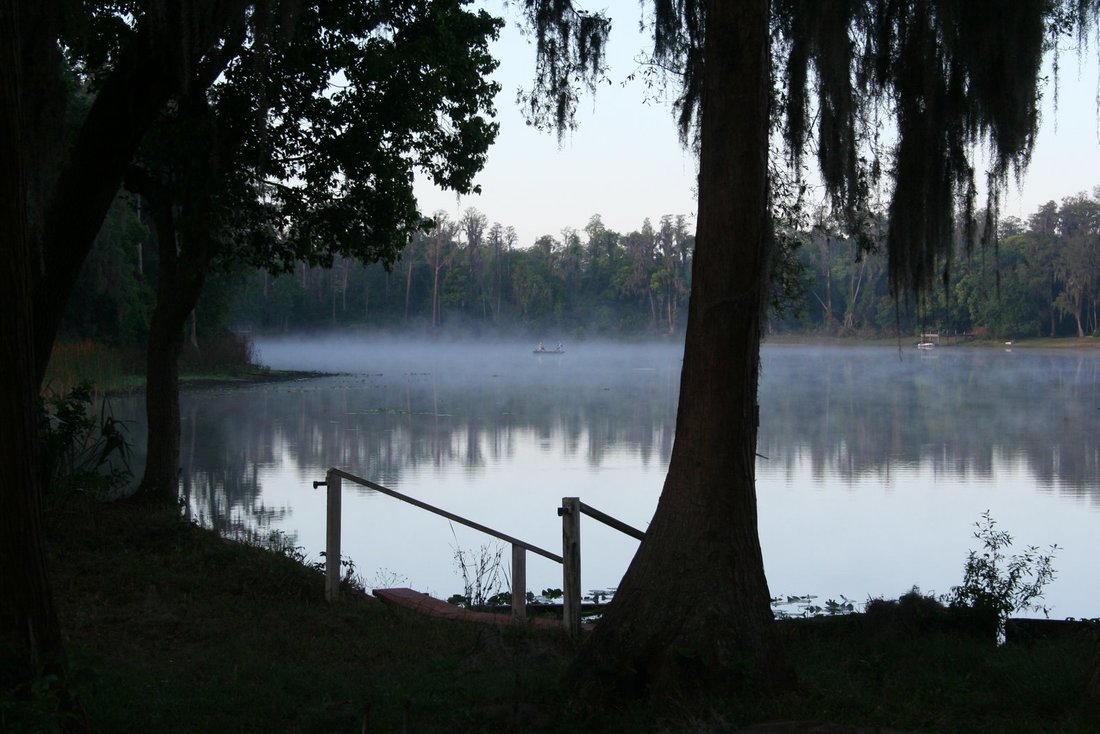 It's been months since I've visited my blog. For years I've blogged and enjoyed Facebook friends, while I avoided the rest of social media. But when I signed with an agent earlier this year, I felt compelled to have a greater online presence. Editors look at a writer's online network when they consider books. I understand. Authors need to sell books or no one in the industry thrives. Today, selling books relies on the internet. So, I opened Twitter and Instagram accounts and expanded my Facebook friends. At first, it was fun searching for friends and people I admire to follow. In the children's book world, everyone is entertaining. Tweets would pop up that I had to share and photos I had to respond to. I'd see something on Facebook that led to a link that led to more time away from writing which let's face it, is the point. It wasn't long before I was overwhelmed by rapid-fire Tweets, photos and Facebook posts. I tried spending fifteen minutes a day on each venue. I tried saving social media for nighttime. When I did pause to think about my blog, I didn't have the energy or the focus to compose anything. My agent said, choose one social media outlet, the one that suits you best, and let the others go. I'm an artist. My writing is full of imagery. She thought Instagram might be the perfect fit. But I don't carry my phone everywhere and even when I do, I don't think about taking pictures. For the sake of Instagram, I tried. I've had the account for months and there's maybe a dozen pictures on there, none of them worth an audience. At some point, I realized I missed this blog. Even if no one read it, it was a quiet place for me to align my thoughts. After conferences and workshops, it gave me a space to analyze what I'd learned. When something profound affected me as an artist and writer, I shared it here. I know there are a gazillion bloggers doing the same thing and this may never attract a single book buyer. But this week, an email landed in my inbox announcing a new writer named Angela had responded to an old post. She related to my experience. That felt more meaningful than all the Tweets and photos. It brought me back here. It made thoughts come out of my head and words land on this page. I don't know how often I'll post, but I'm not ready to give up this blog. I need this quiet place within the internet madness. I know all writers struggle to find the balance between creating books, networking and promotion. Someday, I hope to find a balance that works for me. For the first time since I joined my critique group the Skyway Writers, we took a summer hiatus. Most of us are traveling, restoring body and spirit, feeding the muse with new sights and experiences. We keep in touch through email and social media. Writing is never far from our thoughts and if there's a need, we're available for input on book projects.
Although I didn't leave town, I did honor my muse with a summer conference, a mini workshop and trips to art shows and bookstores. And I wrote. Still, July felt like a creative desert. It stretched long and hot, and I squinted to see the end. I missed my group. I guess I'm slightly addicted. We're a seasoned, serious group. There are five of us, three with books published and two with agents working to sell first books. We aim to publish books until the day we die. And we want them to be good books, so we hire freelance editors to review our work. But before agents, editors or readers see our pages, we look for a thumbs up from each other. We meet every two weeks. If we have pages we want reviewed, we offer our best effort. When we give input, it's presented with love and sensitivity, but fully loaded with honest critical feedback. Every book is a journey and we travel that path together, sharing triumphs and failures that weave into our bond. Twice a year, we retreat to a quiet rural spot where we write, brainstorm and gather around food. For three days we share a guest house on a lake and our muses run free. As the sun goes down and the stars appear, we come together to discuss, celebrate and laugh. Having good writing partners is a blessing I'll never take for granted. Not all groups are alike. It can be a challenge to find the right fit. But a tight knit, productive group doesn't happen overnight, so if you're in a group you're not satisfied with, it might be worth the effort to help it grow. In my next post, I'll talk about what I've learned in a decade of critique groups: what makes them work, what pitfalls to avoid and how to make them flourish. Next week, the Skyway Writers will reunite. Energy will pass between us, and when I leave, I'll be refueled. It will feel like walking out of the desert and into the sea. 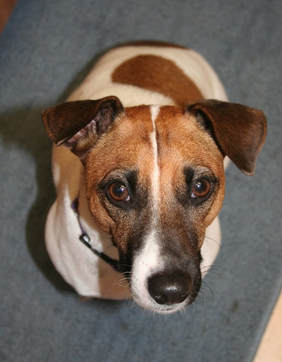 That photo is hard for me to look at because of the feelings it evokes: sadness, loss and longing. Photos do that. So can books. I recently did a workshop with screenwriter and New York Times best selling author Stephanie Storey. What struck me in her talk was the emphasis on bringing EVERYTHING when depicting emotion in a character. It's easy to capture emotion in a photo of beloved dog. In writing, it's so. Hard. To. Do. My critique group partners and I talk about this all the time. We love books because of the emotional connection, but we struggle to write emotion in depth. In a recent Society of Children's Book Writers and Illustrators Insight interview, author Stephanie Garber said that it isn't a colorful cover or favorite genre that makes us keep reading a book. It's the feelings we connect with. She believes feelings are the heart of books. Although I love novels with fantastic world building and intriguing plot, I agree with the Stephanies. What keeps me reading past midnight, what makes me slow down when I near the end, what makes me long for more pages, is my relationship with the character. I want to love a character so much, I dread every bad moment. I want to fight not to close my eyes when danger threatens. When their heart is broken, I want my tears to be unstoppable, and when they triumph, I want my heart to soar. I think most writers try to achieve this and most succeed on some level. But few accomplish a heart-stealing read. I repeatedly ask myself why. I WANT, yes with capital letters, want to write that kind of book. But how do I make that happen? Stephanie Storey goes to great lengths to explore her character's emotions. She visits museums as her character, takes online personality tests, even sees a therapist as her character. She says writers need to bring their deepest, most vulnerable feelings to the page. The part of themselves they're afraid to show to others. Those feelings are what make characters real. So easy peasy, right? Bringing everything means revisiting places in ourselves we'd rather forget. It means remembering painful moments in great detail. So, no, it isn't any more easy or fun than looking at a photo of a dog I lost at a difficult time to a pain-riddled disease. But for books that stay with readers long after they return to shelves, we must go there. 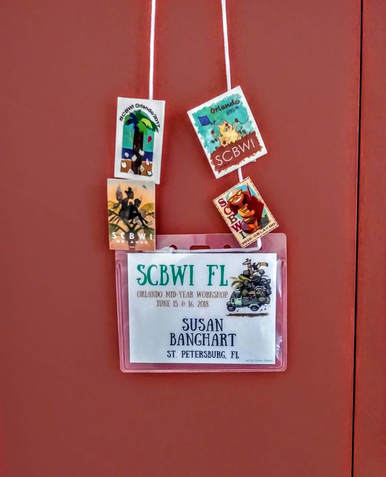 When I was a new writer, dreaming about the books I would write and what they would become, I came to conferences hoping to learn. I was in starstruck awe of everyone, from the seasoned attendees and published authors to the agents and editors. After a few years, I came to conferences hoping to be inspired and learn something from workshops, but I also hoped to earn critiques with agents or editors who might be interested in my work. I knew some of the authors and quite a few attendees. The agents were familiar from the lists I had researched to query my manuscripts. I was no longer starstruck, but I had great respect for authors, agents and publishers. A couple weeks ago I attended Florida's SCBWI summer conference as an agented writer with a book on submission to publishers. My respect for everyone in the children's book world hasn't diminished, it's grown. I'm in awe again, not starstruck-new-writer awe, but the kind of awe that comes from learning how hard everyone, from regional volunteers to agents and editors, works to make published books happen. As I sat in the conference gathering room, waiting for seats to fill and our Regional co-leader Linda Bernfeld to welcome attendees and send us off to workshops, I realized this year was different for me. I was no longer here just for learning or publishing opportunities. I was here because of the people. The writers, young and old, new and seasoned, published and unpublished. We need each other, and I'm one of those seasoned writers now. I want to support new attendees. I want to support the regional volunteers who devote hours and hours for the good of children's writers. I want to be a link in the bond that weaves us together and makes us strong. 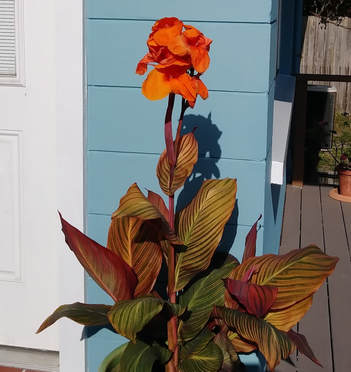 Summer is a time to embrace the outdoors and growing things. I love hanging out with plants. There's so much color and texture in a garden and fascinating paths to explore, from the tiny trail of ants to stepping stones that lead to gates and doors. And everywhere you look, there's a vivid picture or story. I can't go into my yard without seeing a void that needs a spot of color, tall, linear plant or a twisting pathway. When it came time to paint our house, I asked the blooming plants what color they'd like. They picked a medium blue with green tint. Now, my calla lilies, allamandas and Hawaiian Tis are preening and strutting in front of the walls, and the house seems happy with the color. Treating my home and garden as a work of art isn't something I think about, it just instinctively happens. I'm not alone. Many creative minds apply fertile imaginations to their environment. Frida Khalo's home demanded attention just as she did. Called La Casa Azul after the vivid blue color on her walls, her garden complimented the color, or vice versa. Maybe she consulted her plants before she chose that hue. I know she loved them. In self-portraits, blooms from her garden crowned her hair. The New York Botanical Gardens was so fascinated with Frida's planting skills, in 2015 they recreated her home and garden (see above). Beatrix Potter was fascinated with plants, fungi and wildlife and she drew them in exquisite detail. From that love, Peter Rabbit sprang to life. Beatrix was a farmer and a conservationist and she created more than one stunning garden. Many writers escape to their gardens to work. Dylan Thomas penned his poems from this shed overlooking the Taf estuary in Wales. Roahl Dahl admired this shed so much, he recreated it in his garden.
Someday, I hope to add a writing shed to my garden. In the meantime, I'll keep asking my plants what they'd they'd like next. PHOTO ATTRIBUTIONS: The Blue House by Peter Andersen / CC BY-SA Hill Top, Near Sawrey by diamond geezer / CC BY-NC-ND 2.0 Dylan Thomas Writing Shed by wardyboy400 / CC BY 2.0 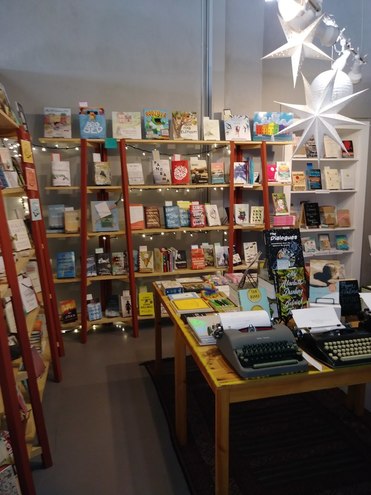 Until I began my journey as a writer, I never fully understood what it took to create a novel. I knew writers had to write them and publishers print and bind them, but I imagined it as a charmed process, with ideas springing to life on the page. Painlessly, seamlessly, in the blink of an eye, there's a book. If you're an author or someone who supports authors, I'll give you a minute to stop laughing before we continue. Done? Okay, let's move on to reality. Most books take years to achieve. First a writer has to learn how to write a good story. That is not a speedy or painless process. Part of that education is writing books. All of them start with an intriguing idea. It may ferment in the author's head for decades before it grows big enough to be a first draft. First drafts take some people months and others, a year or longer to write. And revision, please, lets talk revision. How many drafts is enough? I don't count anymore. My critique group gets my second draft to review. Then I analyze plot and character arcs, map scenes, scribble notes all over the place. Many drafts later, my agent is allowed to see it. Of course, she has suggestions, all of them excellent, for making a better story. Yesterday, after a month or so of brainstorming and revising, I sent my manuscript back to her. I'm waiting for her response. Is it ready to take the next step, be submitted to publishers? Often, I hear books being referred to as babies, birthed on the day they're offered to the public. But I think they're born when they're released from the author's head. My story is now a toddler, taking wobbly steps, hoping to grow into a real book. This is what it looks like today: This is what I hope it grows up to be, a beautiful middle grade book, like my friend Augusta Scattergood's. If you're an aspiring author, I wish you courage and perseverance, and the confidence to believe in your abilities and your books. If you're not a writer, but you love books, I hope you'll treasure them all the more, knowing how hard they worked to reach you.
 I've been querying agents for about eight years. When I started, I kept a hand-written journal, noting the dates and responses I received from my list of carefully researched agents. The last two years, I abandoned my journal for a digital spread sheet. February 12, 2018, I typed the final entry: SIGNED WITH MY AGENT! Ten years learning to write. Four novels queried. Over ninety queries sent. Seventy-one rejections. One offer to represent. The other nineteen agents were informed that I signed with an agent, so I don't know how they would have responded to my work. I've always learned from and been inspired by posts about authors' journeys to acquiring an agent, so I thought I'd share a bit of mine. When I submitted my first book, I had no idea how far I was from being ready. I sent off the requested pages, along with a horrible synopsis. I'm sure it was the easiest rejection of the day for every agent on my list. Was I crushed? Yes, but I moved on. I took online classes, read books on craft, joined two critique groups on top of the one I already belonged to, thinking I'd learn three times faster. And I revised over and over and over again. Five months later, I submitted my first book again, but more cautiously and to fewer agents. I received two requests for partials. Jump for joy, progress! In the end, they all rejected my dear book. So I set it aside, thanking it for all I'd learned. A year or so later, I queried my second book. By this time, I expected the rejections, but they stung just as much. I took my book to workshops and conferences, read more books on craft and listened to critique partners. By the third book, I knew how much I didn't know and was intimidated by how much I had to learn. I considered an MFA, but, given a writer's earning potential and our budget, I couldn't rationalize spending the money. So I plugged along the path. I knew quite a few published authors by now, and it was wonderful to celebrate their new books. It was also growing harder to imagine my books ever sitting next to theirs on a shelf. I learned to write lovely prose and create enticing concepts. Yes, the third book was also rejected when I queried. But two agents said they'd like to see more of my work! And I discovered something crucial in the agents' responses, the weak spot I needed to focus on . . . structure. I needed to learn how to plot. So for my fourth book, I chose a story that would fall apart without a well-conceived plot. Ignoring the urge to create pretty writing, I gave my character a concrete goal and charged towards that goal on an armored-horse with a lance in hand. I worked on that book for almost two years. It won Florida's 2018 Rising Kite contest. I submitted it to agents the week after and was offered representation one week later. Here's what I learned from this journey: Read new books in the age category that's your focus. Read award-winning books. You don't have to analyze them, but become familiar with what kids are reading today, and soak up the way good stories are told. Learn everything you can about writing for children. There are many good books on craft to choose from. Join the Society of Children's Book Writer and Illustrators. Jump on their forum, ask questions and participate in discussions. Attend SCBWI workshops and conferences for motivation, education, networking and opportunities to pitch your book to editors and agents. Find a good critique group. Your local SCBWI chapter can help with that. Critique partners not only help you grow your book, they help with query letters and they're there to support you. Writers understand writers. When you're facing an inbox of rejections, agents can seem like the enemy. They're honestly not. They work weekends and nights, shuffling through massive piles of queries. They give up their days off because they want to find their next client. They want to find stories they love. So, before you send a query, ask yourself if it will shine in that pile of hopeful submissions. Learn what you can from rejections. If an agent responds with a personal comment, read it carefully. Decipher it. Has she said I'm not relating to the character? Study character emotion and how to put that on the page. Did she not connect with the concept? How can you make it more original and dynamic? Perseverance is your best friend. Embrace it. Feed it vitamins. You need it healthy and strong! No two paths are alike. When you start comparing yourself to someone who published their first book after only two years of writing, put blinders on and focus on telling the stories only you can tell. Every book you write teaches you how to write better. There are no wasted efforts, unless you quit. Don't give up! |
AuthorI write middle grade and young adult books with a magical twist, and I'm represented by the fabulous Leslie Zampetti at Open Book Literary. Writer Websites
Augusta Scattergood Maggie Stiefvater Rob Sanders Fred Koehler JC Kato Sarah Aronson Kelly Barnhill Linda Urban Kate DiCamillo Jacqueline Woodson Helpful Links SCBWI Agent Query Lorin Oberweger - Freelance Editor Search BlogArchives
May 2020
Categories
All
|


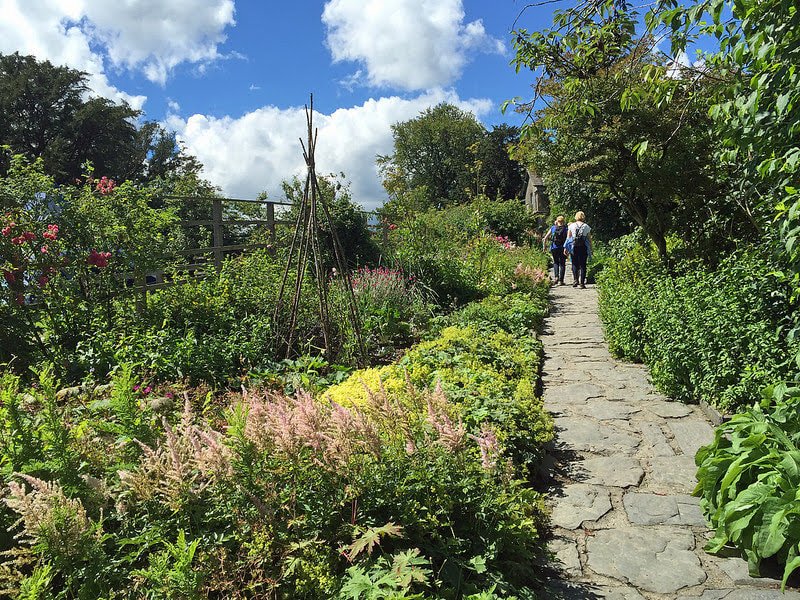
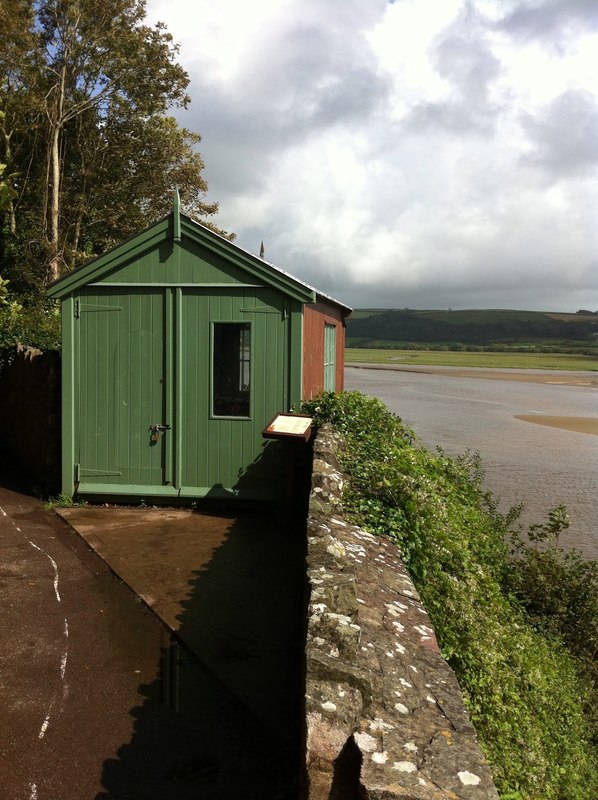
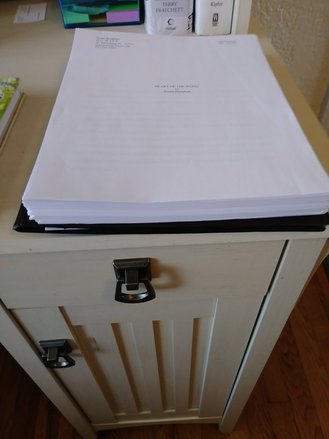
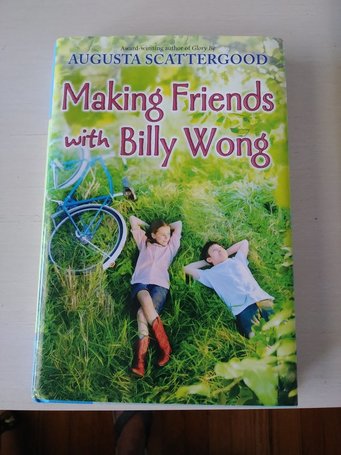
 RSS Feed
RSS Feed
